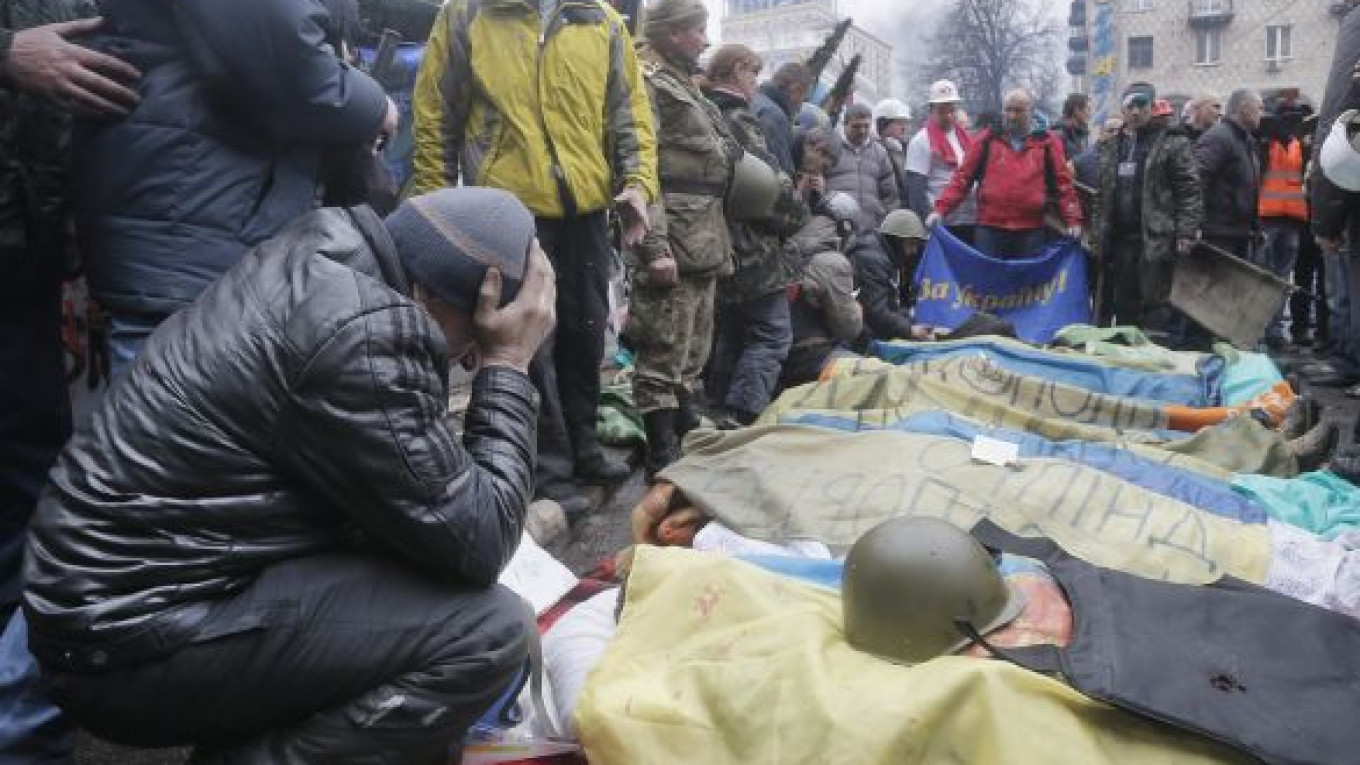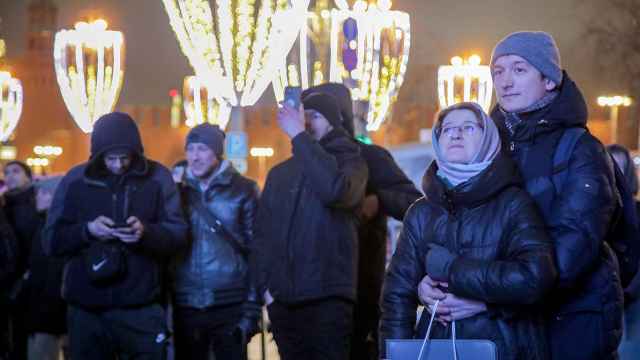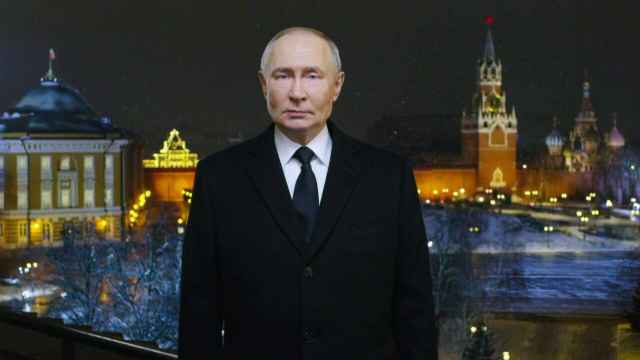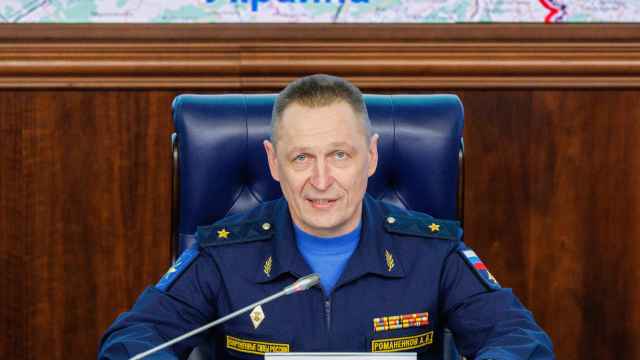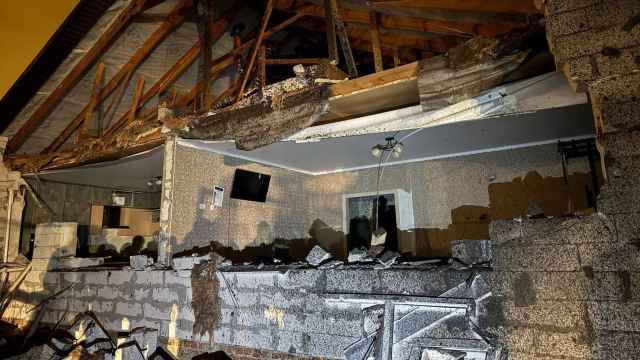Russia warned Ukraine's president not to let opponents walk over him "like a doormat," its strongest signal yet on Thursday that Moscow wants order on the streets before handing over more cash to stave off bankruptcy. In an increasingly bitter struggle for influence in Ukraine between Russia and the West, Moscow upped the ante by directly linking the delivery of $2 billion in loans to the end of protests, which Moscow portrays as led by dangerous extremists.
The warning came as fresh fighting flared in central Kiev, shattering a truce declared by Ukrainian President Viktor Yanukovych, as the Russian-backed leader met European ministers demanding he compromise with pro-European Union opponents.
A Reuters photographer saw the bodies of 21 dead civilians in Independence Square, a few hundred meters from where the president met the EU delegation, after protesters who have occupied the area for almost three months hurled petrol bombs and paving stones to drive riot police from the plaza.
In a sign of dwindling support for Yanukovich, his hand-picked head of Kiev's city administration quit the ruling Party of the Regions in protest at bloodshed in the streets.
The foreign ministers of Germany, France and Poland spent much of the day in Kiev, meeting at length with Yanukovych and extending their stay to talk to opposition leaders.
They sent an interim report to EU colleagues in Brussels, who were meeting to decide on targeted sanctions against those deemed responsible for the worst bloodshed in Ukraine since it left the crumbling Soviet Union 22 years ago.
Prime Minister Dmitry Medvedev said Russia could deal only with "legitimate and effective authorities — a leadership which people are not wiping their feet on like a doormat."
It was a powerful image of how far the Kremlin feels Yanukovych may have dithered into losing control to crowds who have held their ground in central Kiev, driving back riot police who have taken hundreds of casualties.
President Vladimir Putin's spokesman, Dmitry Peskov, put it even more bluntly — the Kremlin's priority was now conflict resolution and only after order was restored could there be "a peaceful, constructive dialogue," he told Ekho Moskvy radio.
On Thursday evening, Putin decided to send an envoy to Ukraine, at the request of Yanukovych, to try to mediate talks between the government and opposition, Russian news agencies quoted Peskov as saying.
"Putin decided to send [Russian] human rights ombudsman Vladimir Lukin on this mission," RIA Novosti quoted Peskov as saying.
The decision came amid reports that Ukrainian anti-government protesters were holding 67 policemen hostage in the capital.
The Ukrainian Interior Ministry said on its website that "Berkut" riot policemen had been armed with combat weapons, an attempt to regain control of violent protests in which at least 50 people have died since Tuesday.
"To free the hostages police have the right to use their weapons," the ministry said in a statement posted to its website.
A further three policemen were unaccounted for, it said.
Yanukovych on Wednesday warned Ukrainians that "advisers" were urging him to crack down and that he would end a policy of restraint if opposition leaders did not distance themselves from radical, armed elements on the streets.
Sources with close knowledge of arrangements to provide Ukraine with the second tranche of a $15 billion funding programme said the decision was now out of the Finance Ministry's hands and had become a political one.
"Given the way the situation has developed, we've put the brakes on. We've called it off for now. But that does not mean that the process cannot resume. The situation has to become clearer," a source familiar with the situation said.
"It is a political decision," another source said.
Russia promised Ukraine the $15 billion bailout and reduced gas prices in December, seen by some commentators as a reward for Yanukovych's decision to scrap plans for trade deals with the EU.
Russia bought $3 billion worth of Ukrainian Eurobonds soon afterwards. The release of the $2-billion second tranche of the bailout had been expected by the end of this week, but the timing is now unclear.
Yanukovych's spurning of the trade and political deal with the EU marked a turn towards reviving ties with Russia, sparking protests in Kiev, where demonstrators seeking to oust Yanukovych are barricaded behind burning tires and fighting riot police.
More than 40 people have been killed.
An anti-government protester holding up a Ukrainian flag while he walks through scorched barricades in Kiev.
Russia has denied it is "buying" the former Soviet republic with the financial aid, portraying it as an "act of brotherly love" towards its Slavic, Orthodox Christian neighbor, a country which many Russians see as an extension of their own.
But with more fighting this week in central Kiev, officials in Moscow have abruptly changed the tone, making clear Yanukovych's earlier assurances that he was in control of events were ringing hollow.
The language used by U.S. and Russian officials has become sharper in the past 24 hours, highlighting the increasingly fraught geopolitical battle that is under way between East and West which is reminiscent of the Cold War.
Russian state television showed a constant loop of pictures of protesters throwing petrol bombs and wielding metal piping and wooden sticks at riot police while Russian commentators lamented the state of the Ukrainian capital.
Putin, who has said little in public about at least four meetings he has had with Yanukovych over the past six months, appears to have given the green light to his long-time political ally, Medvedev, to speak out more firmly on Ukraine as well as his foreign minister, Sergei Lavrov.
"We will try to fulfil all our promises that we made … at the same time for this to happen it is necessary for our partners themselves to be in good shape and for the authorities in Ukraine to be legitimate and effective," Medvedev said.
"We adhere to all agreements but at the same time we [believe] that the authorities must focus on protecting the people and the law enforcement structures that are defending the interests of the state ... only in this case is it possible to develop full economic cooperation," he told Rossia 24 television.
A Message from The Moscow Times:
Dear readers,
We are facing unprecedented challenges. Russia's Prosecutor General's Office has designated The Moscow Times as an "undesirable" organization, criminalizing our work and putting our staff at risk of prosecution. This follows our earlier unjust labeling as a "foreign agent."
These actions are direct attempts to silence independent journalism in Russia. The authorities claim our work "discredits the decisions of the Russian leadership." We see things differently: we strive to provide accurate, unbiased reporting on Russia.
We, the journalists of The Moscow Times, refuse to be silenced. But to continue our work, we need your help.
Your support, no matter how small, makes a world of difference. If you can, please support us monthly starting from just $2. It's quick to set up, and every contribution makes a significant impact.
By supporting The Moscow Times, you're defending open, independent journalism in the face of repression. Thank you for standing with us.
Remind me later.


